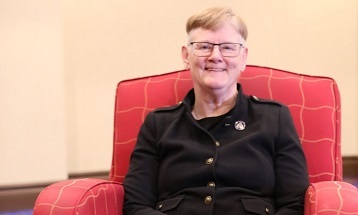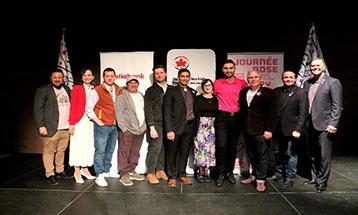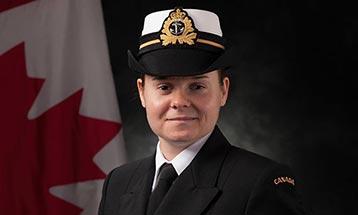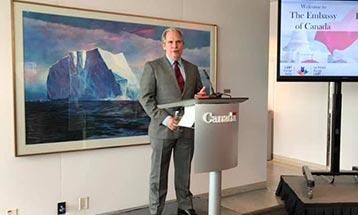As a young girl, Vivienne Stewart dreamed of becoming a cowboy. “I was the horse crazy kid,” the retired lawyer and RCMP Veteran said.
In 1976, Stewart had returned home to British Columbia from a European backpacking trip when she decided to become one of the first women to join the Mounties. “I didn’t want to sit behind a desk, I liked to travel and the whole idea of the force and the Mounties, I thought ‘this sounds pretty cool.’”
Even though she had come out to her close friends, she hadn’t to her family.
Her first inkling that being gay might hinder her new career was when she was asked during her RCMP entrance interview if she liked men.
“I thought ‘Well that’s kind of an idiotic question, I’m going ‘ya I like men fine’, but I don’t want to be with one.”
She began her RCMP career with a posting to Trois-Rivières, QC, then Montreal where she did federal investigations in plain clothes.
When the opportunity to transfer to general detachment and highway patrol in Sydney, Cape Breton arose she put her hand up. “I wanted to wear the uniform,” she said.
Mid-way through her RCMP career she trained to try out for the musical ride. But after witnessing another woman suffer a humiliating experience she turned down the offer to join the ride.
A woman she was thrown into the manure pile on several occasions as part of a hazing ritual. “At the time you think ‘oh that’s just what happens here’ so nobody said anything,” she said. “I just had this really bad feeling about this. My ‘spidey senses’ have always been pretty good.”
The other woman did go on the musical ride but it was not the best experience for her, she remembers.
Although Stewart remembers a collegial relationship with her male coworkers, she recalls a distinct vibe shift after she took part in an arson investigation course in Halifax.
The top brass were nosing into her personal life.
A colleague told her “rumours” had begun swirling that she was gay. With a sudden transfer from Sydney to Digby, she felt the writing was on the wall.
“I had a relationship at the time, I had property, a hobby farm,” she said.
“It’s very subtle but it’s insidious -- once that thought has been put into your mind, you can’t put that rabbit back in that hat, it’s just there.“(I decided) I don’t need the hassles - I’m out of here, you know? I’m gone.”
As Stewart reflects on her experiences in the RCMP, she now realizes they weren’t unique.
“Any profession that has been white male dominated for most of its history you’re going to have discrimination and harassment,” she said.
“I do look at the dark history and go ‘oh my God, that was pretty bad’ and I can’t conceive of what some people had to put up with.”
Stewart left the RCMP in 1984 with seven and a half years of service and moved home to British Columbia to attend law school.
She came out to her family in 1990.
“It was a long time. You grow up in the 50s and 60s that’s the influence you have, you say nothing about that -- you hide, you hide, you hide,” she said, adding even today after a 28-year relationship with her spouse there are places she feels hyper vigilant about revealing their relationship.
“It’s just so ingrained in you.”
A decade ago Stewart joined the RCMP Veteran Womens’ Council to help fight against workplace discrimination and harassment. Last year she retired from a long, successful career in civil and family law.
This year she attended Veterans Affairs Canada’s Women and 2SLGBTQI+ Veterans Forum in Ottawa.
The goal of the forum was to hear from Veterans and help identify and address systemic issues specific to sex, gender identity, gender expression and sexual orientation of under-represented sub-groups within the Veteran population.

Vivienne Stewart proudly wears her rainbow Blundstone boots.
It was a wonderful opportunity to “shine a light into all kinds of little corners that were dark,” Stewart said. “People are coming out and talking about it and other people are going ‘whoa we didn’t even know this was going on or that this was as pervasive as it was’ -- and that’s a good thing.”
Stewart feels heartened by the younger women who are joining police forces and demanding equality and fair treatment in regards to work-life balance.
Her years as an officer taught her a lot.
“I can say I am proud of what I did, I think I was a good cop, I think I was fair to people.”
With courage, integrity and loyalty, Vivienne Stewart is leaving her mark. Discover more stories.



